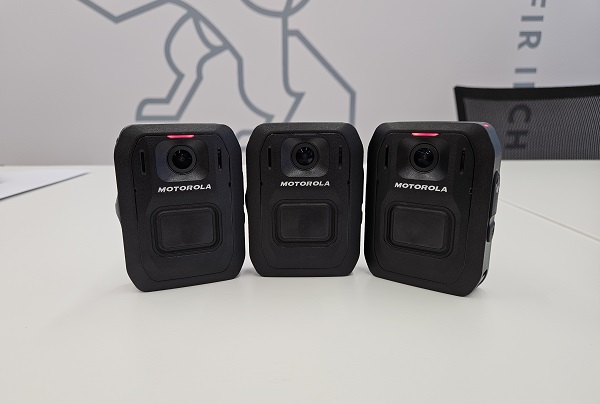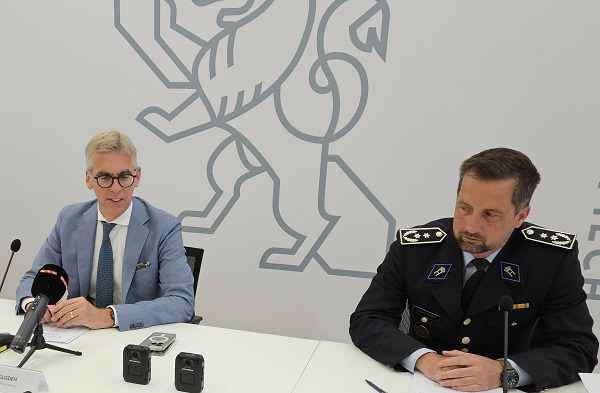 Credit: Jazmin Campbell, Chronicle.lu
Credit: Jazmin Campbell, Chronicle.lu
From Tuesday 1 July 2025, the Grand Ducal Police will equip officers in Luxembourg with body cameras.
Luxembourg's Minister for Home Affairs, Léon Gloden, the Deputy Director General of the Grand Ducal Police, Alain Engelhardt, and Project Manager within the Grand Ducal Police, Jérémy Chiodo, presented details of the planned rollout of police body cameras at a press conference held on Wednesday 11 June 2025.
Minister Gloden recalled that MPs had passed legislation in July 2023 allowing police officers to wear body cameras when on patrol. "Police officers are increasingly confronted with situations of non-compliance with instructions and lack of cooperation," the minister stated, noting that there were more than 400 incidents of "rebellion" against officers between 2020 and 2024. "To ensure their safety and that of citizens, it has been decided to equip police officers with body-worn cameras starting 1 July 2025. These cameras are part of a preventive approach to having modern equipment for a modern police force". He emphasised that "this is in no way about creating a surveillance state, but rather about strengthening security - both that of citizens and police officers."
The body cameras are expected to help prevent incidents during police interventions and to help identify offences and prosecute perpetrators through the collection of evidence. Such evidence can also help determine if an officer has acted incorrectly in certain cases.
As Alain Engelhardt explained, it was important for the police to acquire "excellent" cameras and to prepare to implement a good evidence management system after the legislation was passed two years ago. The police are now able to equip officers across 48 sites with over 1,200 body cameras manufactured by Motorola (representing about €2 million).
Body cameras are visibly installed on the uniforms of police officers who (in most cases) must inform the individual(s) that they are about to be recorded. An audible signal sounds when the camera is activated and a flashing light indicates that the recording is in progress. In practice, this includes images and sounds, the date and time, the identification of the officer wearing the body camera and the location where the recording took place. Once activated, the body camera does not only save what is filmed from that moment on but also the 30 seconds prior to activation - aimed at offering a more global view of the moments leading up to the incident. The camera therefore continuously collects data in its intermediate memory, although this information is automatically overwritten every 30 seconds, unless the officer hits the button to begin recording.
Mr Engelhardt added that when an officer turns on their camera, the cameras of other nearby officers also turn on automatically, in order to obtain a more complete picture of the situation.
Regarding data protection, recordings are transferred to a secure electronic medium (a cloud in Germany) following the intervention. This reportedly guarantees their integrity as well as the traceability of the equipment accessed and the reasons for access. Data is retained for a period of 28 days before being automatically and permanently deleted - unless it is needed to be used as evidence in a preliminary investigation or a judicial inquiry, for example.
To raise awareness among the public of the introduction of police body cameras, a media campaign is being launched. Further information is also available on the dedicated web page: police.lu/bodycams.
(Pictured L-R: Léon Gloden, Luxembourg's Minister for Home Affairs; Alain Engelhardt, Deputy Director General of the Grand Ducal Police)









